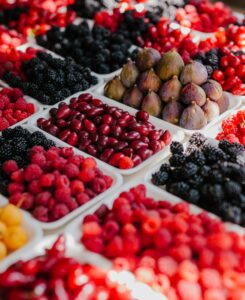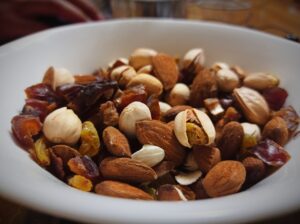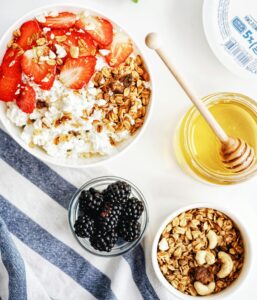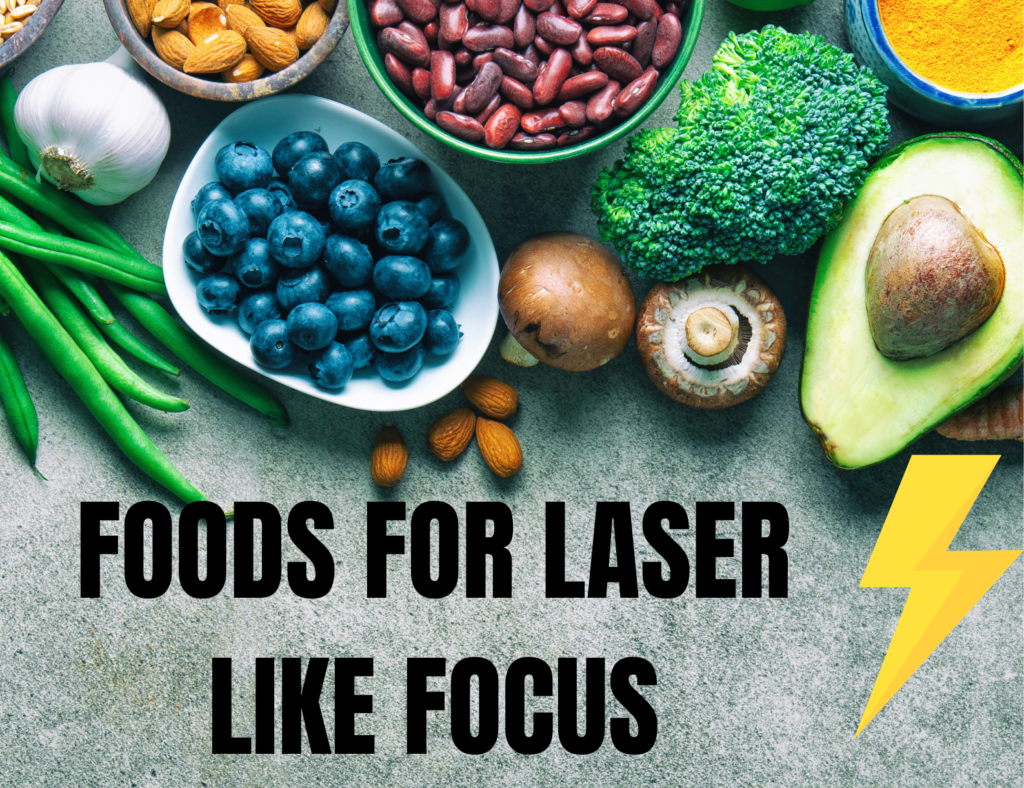Table of Contents
ToggleFocus Fuel: Foods That Elevate Your Focus
The key to unlocking laser-sharp concentration isn’t just sheer willpower. Enter the world of cognitive nutrition – a realm where the food you eat plays a pivotal role in enhancing your focus and concentration.
The Crucial Link Between Diet and Cognitive Function
Before we delve into the specifics of brain-boosting foods, let’s take a moment to understand the profound connection between your diet and cognitive function. Your brain, the command center of your body, is a complex organ that requires a delicate balance of nutrients to function optimally. Every thought, every decision, and every moment of focus is underpinned by the intricate dance of neurotransmitters and the fuel provided by the food you consume.
Unraveling the Neurotransmitter Web
Neurotransmitters, the chemical messengers of the brain, play a crucial role in regulating mood, attention, and focus. Take dopamine, for instance – often hailed as the “feel-good” neurotransmitter. It not only contributes to pleasure and reward but also influences attention and concentration. On the flip side, an imbalance in neurotransmitters like serotonin can lead to difficulties in concentration and focus.
The Importance of a Balanced Diet
Just as a car requires the right fuel to run efficiently, your brain needs a balanced diet for optimal cognitive performance. Picture this: you wouldn’t expect your car to perform well on low-quality fuel, so why expect the same from your brain? A well-rounded diet provides the essential nutrients that support cognitive function, helping you stay sharp, attentive, and focused throughout the day.
I. Understanding the Brain-Food Connection
Nutrients as Brain Fuel
Imagine your brain as a high-performance engine. To keep it running smoothly, you need to feed it with the right kind of fuel. Nutrients derived from the foods you eat are the building blocks of this fuel. Whether it’s carbohydrates for quick energy, proteins for neurotransmitter synthesis, or fats for brain structure, each nutrient plays a vital role.
The Role of Omega-3 Fatty Acids
Let’s zoom in on one particular group of nutrients that has garnered much attention in recent years – omega-3 fatty acids. These essential fats are like superheroes for your brain. They contribute to the structure of cell membranes, facilitate communication between brain cells, and even play a role in the production of neurotransmitters.
Sources of Omega-3s:
If you’re wondering where to find these brain-boosting omega-3s, look no further than the depths of the ocean and your local health food store. Fatty fish like salmon, mackerel, and sardines are rich sources of these essential fatty acids. For our plant-based friends, chia seeds and flaxseeds are excellent alternatives.
Antioxidants: Guardians of Brain Health
Now, let’s turn our attention to another set of nutritional superheroes – antioxidants. Just as a shield protects a warrior in battle, antioxidants shield your brain from oxidative stress. Oxidative stress, caused by free radicals, can damage brain cells and impair cognitive function. Antioxidant-rich foods act as the frontline defence, neutralizing these free radicals and preserving your cognitive prowess.
Foods Rich in Antioxidants
Berries take center stage in the antioxidant arena. Blueberries, strawberries, and raspberries are not only delicious but also pack a powerful punch of brain-protective antioxidants. And for those with a sweet tooth, dark chocolate in moderation can be a guilt-free indulgence that supports brain health. Leafy greens like spinach also make the list, offering a double whammy of vitamins and antioxidants.
The Vital Role of Vitamins and Minerals
Now, let’s shine a spotlight on the unsung heroes – vitamins and minerals. Vitamin B, vitamin D, iron, and zinc are essential players in the cognitive symphony, each contributing to different aspects of brain function.
Essential Vitamins and Minerals
-
Vitamin B:
Found in abundance in whole grains, eggs, and leafy greens, vitamin B is crucial for neurotransmitter synthesis. It’s the fuel that helps your brain cells communicate effectively. -
Vitamin D:
While sunlight is a natural source of vitamin D, you can also find it in fatty fish, fortified dairy products, and egg yolks. Vitamin D is a key player in cognitive function, with deficiencies linked to cognitive decline. -
Iron:
Found in lean meats, legumes, and leafy greens, iron is vital for oxygen transport. A well-oxygenated brain is a focused and alert brain. - Zinc: Nuts, seeds, and legumes are rich in zinc, a mineral that supports overall cognitive function. It plays a role in memory formation and concentration.
Remember that the foods you choose to include in your diet can either fuel or hinder your cognitive performance. Now that we’ve laid the foundation of the brain-food connection, let’s dive into the practical aspects of incorporating these nutrients into your daily life
II. Essential Nutrients for Focus

Now that we’ve established the profound impact of nutrition on cognitive function, let’s delve deeper into the essential nutrients that can transform your focus and concentration. Picture these nutrients as the architects behind a well-structured and highly functional brain.
Omega-3 Fatty Acids: Building Blocks for Brain Excellence
Importance of Omega-3s:
Omega-3 fatty acids are the unsung heroes of cognitive health. These fats, primarily found in fatty fish, chia seeds, and flaxseeds, play a crucial role in the structure and function of your brain. They enhance neural communication, promote the formation of new synapses, and even contribute to the synthesis of neurotransmitters.
Sources of Omega-3s
1. Fatty Fish: Salmon, mackerel, and sardines are rich sources of EPA and DHA – two types of omega-3 fatty acids crucial for brain health.
2. Chia Seeds: These tiny seeds are a plant-based powerhouse of omega-3s, providing a valuable alternative for those following a vegetarian or vegan diet.
3. Flaxseeds: Ground flaxseeds are not only a great source of omega-3s but also pack a fiber punch, supporting overall digestive health.
Antioxidants: The Guardians of Your Brain
Role in Brain Health:
Antioxidants act as the body’s defense against oxidative stress – a process that can lead to cell damage, inflammation, and cognitive decline. By neutralizing free radicals, antioxidants help preserve the integrity of your brain cells, ensuring they function optimally.
Foods Rich in Antioxidants
1. Berries: Blueberries, strawberries, and raspberries are antioxidant-rich fruits that can be easily incorporated into your diet. Enjoy them as a snack, blend them into smoothies, or sprinkle them over yogurt.
2. Dark Chocolate: Yes, you read that right! Dark chocolate, in moderation, provides a sweet and indulgent way to boost your brain health.
3. Spinach: Packed with vitamins and antioxidants, spinach is a versatile leafy green that can be added to salads, omelets, or smoothies.
Vitamins and Minerals: The Unsung Heroes of Cognitive Function
Vitamin B: The Neurotransmitter Support
- Whole Grains: Incorporate whole grains like oats, quinoa, and brown rice into your meals. These grains are rich in vitamin B and provide sustained energy for your brain.
- Leafy Greens: Spinach, kale, and Swiss chard are not only antioxidant-rich but also excellent sources of vitamin B, supporting neurotransmitter synthesis.
Vitamin D: The Sunshine Vitamin for Cognitive Well-being
- Fatty Fish: In addition to omega-3s, fatty fish like salmon and tuna are potent sources of vitamin D, crucial for cognitive health.
- Fortified Foods: Opt for fortified dairy products and cereals to ensure you’re meeting your vitamin D requirements, especially if sunlight exposure is limited.
Iron: Oxygenation for Focus
- Lean Meats: Incorporate lean meats like chicken and turkey into your diet. These meats are rich in iron, supporting oxygen transport to your brain.
- Legumes: Beans, lentils, and chickpeas are plant-based sources of iron, ideal for vegetarians and vegans.
Zinc: Memory and Concentration Support
- Nuts and Seeds: Almonds, pumpkin seeds, and sunflower seeds are excellent sources of zinc, contributing to memory formation and concentration.
- Legumes: Beans and lentils not only provide iron but also contain zinc, offering a double benefit for cognitive function.
Wrapping up this exploration of essential nutrients, keep in mind that balance is key. A well-rounded diet that includes a variety of foods rich in omega-3s, antioxidants, vitamins, and minerals is the foundation for sustained focus and concentration.
Next, we’ll unravel the art of smart snacking – a strategy to keep your brain fueled throughout the day. Next, some practical tips and delicious snack ideas that enhance your cognitive prowess.
III. Smart Snacking for Sustained Focus

Welcome to the snacking arena – a crucial battleground for maintaining sustained focus throughout the day. Smart snacking isn’t just about satisfying your taste buds; it’s about providing your brain with the fuel it needs to stay sharp. Let’s explore balanced snack ideas and the importance of hydration in supporting cognitive function.
Balanced Snack Ideas
Nuts, Seeds, and Dried Fruits Combinations
- Almonds and Dried Cranberries: A power-packed combo of healthy fats, antioxidants, and a touch of sweetness.
- Walnuts and Raisins: Rich in omega-3s and natural sugars, this duo offers a quick energy boost.
- Pumpkin Seeds and Dried Apricots: Packed with zinc and fiber, this snack keeps you feeling full and focused.
Greek Yogurt with Honey and Berries

- Protein Boost: Greek yogurt is a protein powerhouse, promoting neurotransmitter synthesis.
- Antioxidant Burst: Top it with honey and a handful of berries for added antioxidants and natural sweetness.
Whole Grain Crackers with Cheese
- Complex Carbs: Whole grain crackers provide a steady release of energy, supporting prolonged focus.
- Protein Power: Pair them with cheese for a delightful combination of protein and carbohydrates.
IV. Meal Plans for Maximum Concentration

Congratulations on making it to the heart of our nutritional journey – meal plans crafted to elevate your concentration and keep you firing on all cylinders throughout the day. We’ll explore breakfast boosters, lunch strategies for sustained energy, and dinner choices that foster evening productivity.
Breakfast Boosters
They say breakfast is the most important meal of the day, and when it comes to concentration, this adage holds. Jumpstart your day with nutrient-rich options that set the tone for hours of focused productivity.
Nutrient-Rich Breakfast Options
1. Oatmeal with Berries and Nuts: A powerhouse of complex carbohydrates, fiber, antioxidants, and healthy fats. The combination ensures sustained energy and mental clarity.
2. Eggs with Spinach and Whole Grain Toast: Protein-packed eggs, vitamin-rich spinach, and whole grains provide a balanced and filling breakfast, supporting neurotransmitter function.
3. Smoothie Bowl with Greek Yogurt and Fruit: Blend your favorite fruits with Greek yogurt, and top with granola and nuts for a delicious and nutritious morning treat.
Impact of a Wholesome Breakfast on Day-Long Focus
- Steady Energy Release: A balanced breakfast prevents the energy rollercoaster, ensuring a steady release of glucose for your brain.
- Nutrient Infusion: Breakfast provides essential nutrients like vitamins, minerals, and proteins, setting the stage for optimal cognitive performance.
- Improved Mood: Starting your day with a nutrient-rich breakfast positively influences mood and enhances overall well-being.
While we are on the topic topic of ‘Boosters’, have a look at this post on Shilajit – natures ultimate energy booster.
Lunch for Sustained Energy

Midday is a critical juncture where the right food choices can either fuel your productivity or lead to an energy slump. Let’s craft lunches that sustain your energy levels without inducing post-lunch lethargy.
Balanced and Nourishing Lunch Ideas
1. Quinoa Salad with Chickpeas and Vegetables: Quinoa offers a complete protein source, while chickpeas provide a dose of fiber and essential minerals.
2. Grilled Chicken Wrap with Avocado and Greens: A protein-packed wrap with healthy fats from avocado and a mix of greens for added vitamins.
3. Salmon and Brown Rice Bowl: Fatty fish like salmon, paired with brown rice, create a lunch rich in omega-3s and sustained energy.
Avoiding Heavy Meals that Induce Post-Lunch Lethargy
- Moderate Portions: Opt for moderate portions to avoid the energy-draining effect of a heavy meal.
- Incorporate Lean Proteins: Protein-rich lunches support alertness without causing a dip in energy levels.
- Complex Carbohydrates: Choose whole grains for a slow and steady release of energy, preventing the dreaded afternoon slump.
Dinner Choices for Evening Productivity
As the day winds down, your dinner choices can impact your evening productivity and the quality of your sleep. Let’s explore light and nutritious dinner options while highlighting foods to avoid close to bedtime.
Light and Nutritious Dinner Choices
1. Grilled Vegetables with Quinoa: A plant-based option rich in vitamins, minerals, and fiber, supporting digestion and overall well-being.
2. Stir-fried tofu with Broccoli and Brown Rice: Tofu provides a protein boost, while broccoli adds a dose of antioxidants and fiber.
3. Turkey and Vegetable Skewers: Lean turkey paired with colorful vegetables creates a balanced dinner that won’t weigh you down.
Foods to Avoid Close to Bedtime for Better Sleep Quality
- Caffeine: Minimize caffeine intake in the evening, as it can interfere with sleep. Opt for herbal teas or warm milk instead.
- Heavy and Spicy Foods: These can cause discomfort and indigestion, potentially disrupting your sleep.
- Sugary Treats: While tempting, sugary treats can lead to energy spikes and crashes, affecting the quality of your rest.
As we conclude this section, remember that each meal is an opportunity to fuel your brain for optimal performance. Stay with us for the next section, where we’ll explore the often overlooked but crucial role of hydration in maintaining focus. Prepare to unlock the secrets of brain-boosting beverages and the impact of water on cognitive abilities.
V. The Role of Hydration in Focus
Significance of Staying Hydrated:
- Cellular Function: Essential for various cellular processes, water is particularly vital for those occurring in brain cells. Dehydration can impede these processes, affecting overall cognitive performance.
- Brain Volume Maintenance: Proper hydration safeguards optimal brain volume, preventing a decline in cognitive function associated with dehydration.
- Enhanced Focus and Attention: Hydration supports neurotransmitter production, amplifying your ability to concentrate and stay focused.
Crafting a Hydrating Snack Routine:
- Listening to Your Body: Pay attention to your body’s signals. Thirst, a clear sign of dehydration, can be addressed by incorporating snacks with water-rich components, such as fruits, contributing to overall fluid intake.
Impact of Dehydration on Cognitive Abilities
- Memory Impairment: Dehydration can hinder both short-term and long-term memory, impacting your ability to recall information.
- Reduced Attention Span: Even mild dehydration is linked to a decrease in attention span, making it challenging to stay focused on tasks.
- Perception of Task Difficulty: Dehydrated individuals often perceive tasks as more challenging than their well-hydrated counterparts, impacting overall productivity.
Brain-Boosting Beverages
Let’s explore brain-boosting beverages that support mental clarity.
- Water: The simplest and most effective way to stay hydrated is by consuming at least 8 glasses a day, adjusting based on factors like activity level and climate.
- Green Tea: Rich in antioxidants and containing a moderate amount of caffeine, green tea provides a gentle energy boost without the jitters, linked to improved mood and cognitive function.
- Herbal Teas: Chamomile, peppermint, and ginger teas contribute to hydration while offering calming effects, reducing stress and promoting focus.
- Coconut Water:
 Naturally refreshing and packed with electrolytes, coconut water is an excellent choice for rehydration, supporting overall cognitive function.
Naturally refreshing and packed with electrolytes, coconut water is an excellent choice for rehydration, supporting overall cognitive function.
Final Words:
In adopting a holistic approach to nutrition, you’re not just fueling your body; you’re nourishing your mind. Every bite, every sip is an opportunity to support optimal cognitive performance. From omega-3 fatty acids to antioxidants, vitamins, and minerals, the foods you choose shape the foundation of your focus and concentration.
Remember, it’s not about rigid diets or drastic changes. It’s about making informed choices that align with your goals and lifestyle. Whether it’s a nutrient-packed breakfast, a balanced lunch, or a hydrating herbal tea in the afternoon, each choice contributes to the symphony of cognitive well-being.
Embrace these dietary strategies in your daily life. Experiment with new recipes, discover the joy of nourishing your body and mind and observe the positive impact on your focus and productivity. Small, consistent changes can lead to significant results.
In a world filled with distractions, cultivating focus is a superpower. And with the right fuel, you can harness that power. So, go ahead, fuel your focus, and embark on a journey of enhanced cognitive clarity and productivity. Your brain – and your goals – will thank you.



